#and kind of thematic at that
Text

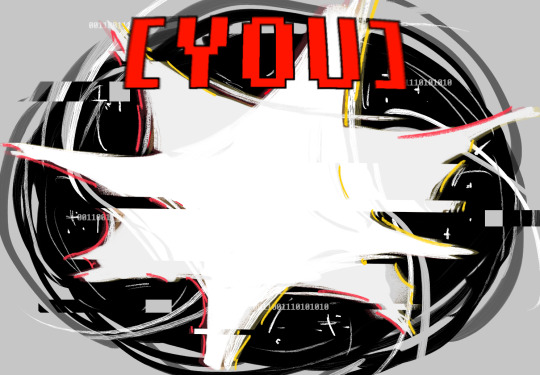
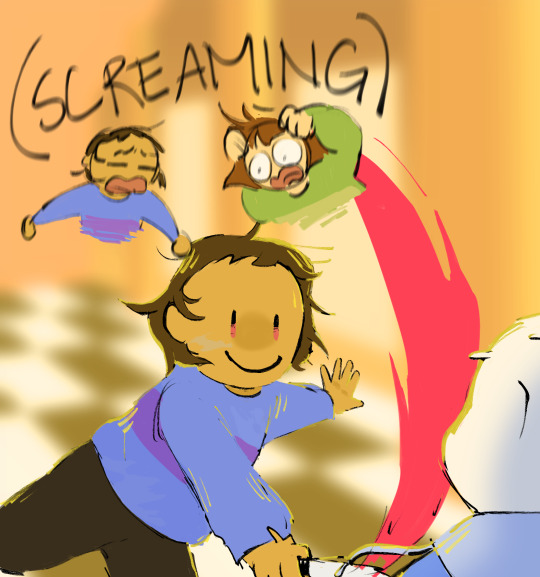
but if I'M a traumatized kid and YOU'RE a traumatized kid... who's playing the game!?
#frisk#chara#undertale#i just think the player as some kind of eldritch entity would be sooooo funny. the eldritch god capable of deleting everything#wants to smooch a ghost#also i'm not really a subscriber of 'demon chara' theory/canon#like thematically they DO represent the player or whatever#but also#.... they are just a silly kid :)#who likes chocolate :)#plart
14K notes
·
View notes
Text
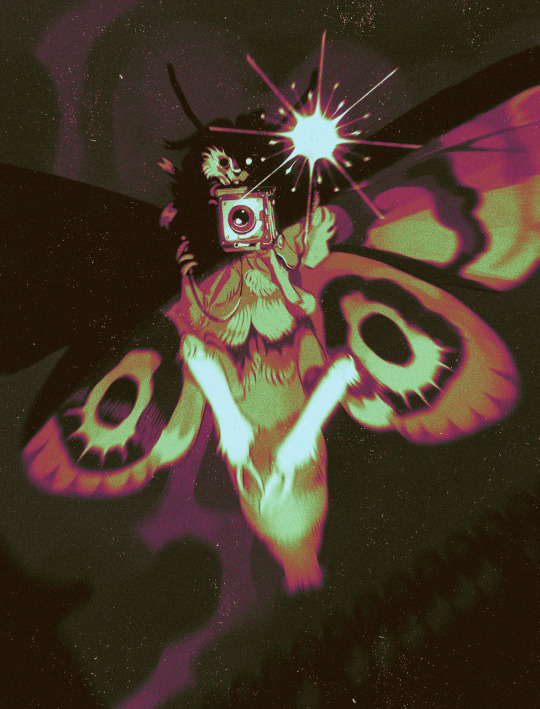
let's see how YOU like it
#incredibly last minute halloween art from me to u. as in i started this at 9pm just now#setting: thera#moths#they're kind of a mothman i guess. it's thematic enough#it's that old-timey flash photography where the flashbulb is held overhead. that's what they're doing
6K notes
·
View notes
Text
I don't know if this is what Tolkien intended, but whenever I picture Maglor's Gap I picture it in the spring; a meadow in full bloom, with colorful flowers and gentle bumblebees. While Himring is icy for much of the year, the lower plains around it are warm and welcoming for a good few months in the spring and summer, and have much milder falls and winters.
I feel like it's important for Maglor's Gap to be not just a strategic choke point, but a genuinely beautiful piece of Beleriand that Maglor and his followers loved dearly. Somewhere they thought of as a home. Somewhere they eulogized in songs long after it was destroyed.
Maglor sings of the Gap, in the Noldolante, but the only part of it remembered there is the part where it was scorched into nothingness.
But he also told Elrond and Elros about his old home; keeping its better memories alive. Elrond, as Gil-Galad's minstrel in the Second Age, often sings songs about the wildflowers and songbirds of the Gap in Spring. Not many know that's what he's singing about, but he does, and that's enough.
#silmarillion#silm headcanons#elrond#elrond peredhel#elros#maglor#maglor's gap#beleriand#geography and nature of middle-earth my beloved#fluffy middle earth bumblebees could fix me actually#I feel like Maglor and Elrond are two very different kinds of memory#we need more minstrel Elrond also#it's very thematically interesting
171 notes
·
View notes
Text
Hamlet randomly being kidnapped by pirates halfway through the play - an event that happens entirely offstage and is only revealed by Horatio reading a letter out loud - has the exact same energy as “Somehow, Palpatine has returned.”
#hamlet#aka it’s a bad plot device 🤣#Shakespeare was so busy cramming insane amounts of character and thematic brilliance into his story#that he kind of forgot about having a cohesive plot#‘oh shit we need to somehow get Hamlet back from Denmark and R&G out of the picture. uhhhh….. PIRATES!’#This is not really a critique bc the plot is not really the point of Hamlet#i just think it’s funny
381 notes
·
View notes
Text
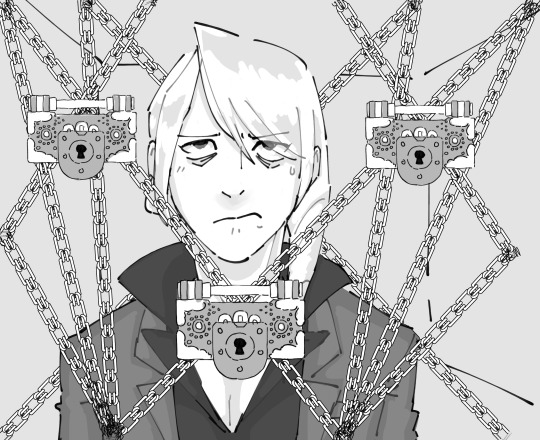
my head hurt.
#wanted to put actual color into this but whatever#ace attorney#klavier gavin#turnabout light#take a cute little thematic preview#kind of a spiritual successor image to the original three panel comic#hailey's drawing again#time to go perish in bed
375 notes
·
View notes
Photo
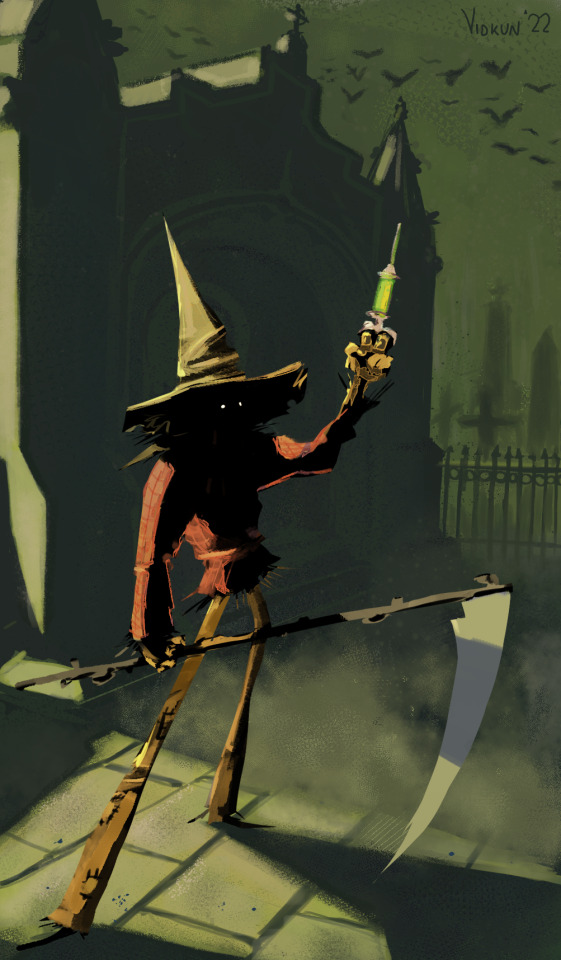
hush hush hush, here comes the bogeyman -- don’t let him come too close to you, he’ll catch you if he can
#jonathan crane#scarecrow#dc#vidkun draws#scarecrow dc#wanted to compare how my arts changed in 2 years so this is a kind of thematic redraw of a old piece
2K notes
·
View notes
Text
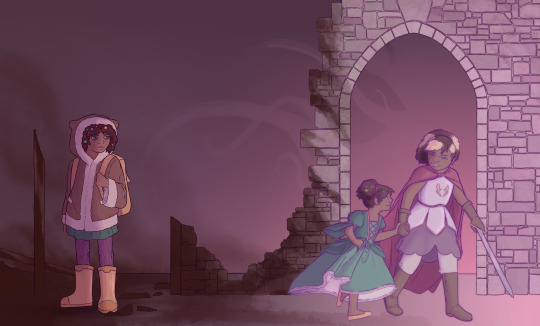
“She used to be nice, I think. We used to play together. She used her powers outside of her bubbles more and we would play.” They’d had tea parties in real castles. They’d traveled through enchanted forests together. She had worn a real princess dress and her sister had been her knight. Her protector.
#epithet erased#molly blyndeff#lorelai blyndeff#prison of plastic#I'm actually not sure I'm happy with how this thing came out. It's not what I pictured when starting out but#i am simply not spending more time on this thing#also this thing nearly fried my computer while rendering because of how many layers I was using which I guess it. Thematically fitting.#an onion kind of artpiece. too many layers. makes me cry.
227 notes
·
View notes
Text
shout out to keith this season for deciding that despite not having characters who were close to gur sevraq before that eclectic should get involved, and now within two missions eclectic has had a traumatic gur related experience and is obsessively watching gur sevraq tapes and having psychic visions inside them. as a gur fan i feel so represented. thank you keith
#fatt personal tag#palisade spoilers#tbh i actually think the gur/future stuff is thematically relevant to the whole cast at this point#its about divine/person relationships and reckoning with past actions and fascism controlling your identity#so i kind of hope everyone gets involved in the finale not just eclectic#but im not getting my hopes up
62 notes
·
View notes
Note
Beyond surface appeal, what makes Ganon a compelling antagonist
I think cruising my blog would provide a good number of possible answers, but I guess my tl:dr would be (otherwise I could probably make a full 24h conference about it at this point): because he does reveal (if one is willing to look) the brutality of a world in which gods uphold a natural order through a given kingdom that will not budge on its god-given right to rule, and him as both a rebellious disorder to that status quo which also ends up devoured by said status quo as just one natural part of a cycle of creation and destruction that ultimately always kind of stays the same.
Also, I find the setup of a man born to a tribe of outcast women, considered exceptional by birth while also having to figure himself out + the role he needs to play in that kind of structure and in a very difficult context, someone who both is being granted a lot of natural power while also still being sneered at and considered lesser and/or inherently evil by those blessed by the gods (while also carrying a lot of unexamined baggage of their own), is just so juicy and interesting and brimming with potential psychologically speaking (especially when applied to his motivations of: why does he want power, why does he always alter his own body, his uncanny resilience, etc). It does come with a lot of baggage, as "the evil man from the desert" is far from being a neutral concept coming from a neutral historical place --but examining what kind of world would come to such conclusions is also deeply revealing of said world.
And then, Wind Waker gives him even more of a window to reflect on his own rage while also never apologizing for the horrors he commited, mourning what he wanted and what he became while also being the only one calling the gods of Hyrule out for being terrifyingly cold entities --far more than he could ever hope to become.
Yeah, I think Nintendo has been sleeping on Ganondorf ever since (even if I defend his TP appearance). But he has a fascinating cross-game story(ies), and I find him to be a deeply tragic --if horrendously flawed-- figure, which is partially why TotK was so disappointing to me, because TotK saw nothing but the surface level + the fact that putting him in a game sells and makes people horny.
(you'll notice I didn't mention Demise, because I think that, while the whole cycle thing wasn't bad or not that interesting, fans really overly simplify this concept in a way that has contributed to make Ganondorf extremely flat, which I am not here for.)
#asks#thoughts#ganondorf#there's much more than this obviously#his weird contradiction of both wanting power and self-definition while also being desperate for the gods' approval in a way#his relationship to beasts and monsters and demons and his own humanity#his relationship to his mothers and his gerudo heritage#the way he's a foil to link and zelda#and from a game design perspective there's a ton of things too#like how he's a very proactive antagonist in most games which helps guiding the storytelling from one setpiece to the next#he's kind of having his own adventures in a way and you must follow his trail and/or foil his plans and/or survive his trickeries#and thematically when done well he can be a great foil too#anyway love this weird sad angry boar-man#great hair too
54 notes
·
View notes
Text
thinking about how dongsik and joowon are the inverse of each other. thinking about joowon's journey realizing that blood is not thicker than water, ties can be severed from abusive family members (no matter how painful that is) and that among many things, his father's cruelty is what took away and destroyed dongsik's family who actually were a positive force in his life. many things about beyond evil appeal to me, but i mainly want to put a pin on the central themes of the show, particularly the failures of adults and parental figures, how that ripples through the lives of their successors in an especially vicious and self-destructive manner. this is a commonality found between multiple characters in the show (minjeong, joowon and jeongje) - but i want to put emphasis on joowon's struggle with this because his path to freedom was walked to completion, in comparison to minjeong whose life was cut short and jeongje who we part with carrying the painful knowledge that he may never achieve absolution, as his journey has only begun.
the show, technically starts at the beginning of joowon's journey/arc. unfamiliarity and discomfort force him to adapt and self-reflect, because the only way joowon was able to free himself was by breaking every rule his father set for him, going beyond his selfish confines and breaking down the walls he built. joowon is unable to get his physical body dirty, he is emotionally closed-off and is incapable of understanding why the people in manyang, particularly dongsik, would look out for anyone other than themselves. he is selfish, rigid, guilt-ridden and bashful; but it is exposure to dongsik's unwavering faith in and patience for others (for jeongje, for sangbae, for the people of manyang that have wronged him for years) that erode his harsh edges. dongsik, although not without flaws and contrary to what his outer appearance and manner of speech radiate, is kind and forgiving. that kindess, that forgiveness, as well as joowon's own guilt and shame is essential to getting him to a point where he is comfortable bloodying his hands, his clothes, and his face to protect dongsik (+ jihwa and her partner. to protect his friends).
dongsik recognizes joowon's pain too ("i know what it's like to be blamed for something you didn't do"). he sees his guilt, it's not inordinate to what joowon's done per se but a large portion of it brings so much shame to joowon ("please, stop doing unnecessary things out of guilt.") how could i have been so self-righteous when the man who bore me is responsible for so much misery? how do i rectify this, how do i absolve myself from the guilt? all dilemmas joowon grapples with, and dongsik, knowing pain and shame all too well does not grant joowon mercy when he is bowed down, forehead to cuffed hands while joowon's own are also cupping dongsik's, begging for it. mercy is letting joowon go, it's lifting the burden of responsibility off his shoulders - but instead, dongsik’s final request ensures that joowon truly atones ("i ask you to arrest me" - "no, how could i do that? i have no right") by informing him that the only way to live with guilt is to try and do right by the people who expect something from him. "joowon-ah", dongsik says as he softly picks up joowon's clenched fist, the look they share informs joowon that going through with the arrest is how he'll do dongsik right. it's what dongsik, his now friend, expects from him. that's what their final scene as partners is all about, in my opinion.
and something good does come out of dongsik's firm but tender confrontation. joowon gradually becomes a better person who seeks community and whose life, in return, is enriched by the friends that forming community gave him. dongsik and joowon's parting is bittersweet, but in letting joowon know that his actions matter to others and that he is wanted and expected by others - (jihwa, as part of the larger collective whose feelings towards joowon are influenced by dongsik's, texts him and checks in - that expectation to show up and empathy for when he does not respond is an invitation letting him know that there is a place for him if he chooses to occupy any) - dongsik sets him free.
#god im sorry i dont meta on here often but i physically needed to let all of this out.#user aboutmercy is obsessed with the thematic idea of granting and denying mercy? oh im SURE#also. joowon was such an ass in the beginning lmao i love him so much......#if dongsik was any less crazy and any less generally patient and kind as a character trait then it would've been so over for joowon#the contrasts i've noted between jwds are abusive home/loving family - kind/really mean - confident/insecure..#i'll perhaps find more on a rewatch. but it's so interesting how different they are yet so fundamentally broken#that they couldnt have resisted being drawn to each other.#ds to jw: 'the depressed and obsessive man in me sees the depressed and obsessive man in you'#beyond evil#lee dongsik#han joowon#jwds#also. sorry if this is bullshit i’m just……. filled with agonies. bc i love han joowon#jtbc beyond evil
58 notes
·
View notes
Text
kira's ongoing narrative in relation to cardassia and post-genocide complication of easy stories -- not, of course, that it was not genocide, but that some people she thought of as enemies were allies, and many people who were a part of the oppressing forces, were later, in turn, the victims of a mass attempted-genocide
and the idea that she, personally, cannot hate every individual cardassian, because she genuinely wants to build and heal and what that looks like, versus many (understandably) traumatised bajorans who are still and will always be at war
it's such a complicated, ongoing, twisty-turny storyline that returns again and again, with dukat, with garak, with ghemor, with damar, with ziyal, with rugal (although he and kira don't really interact, but in terms of the wider complexity of bajoran-cardassian interactions), with marritza (I've forgotten characters I know it -- there's natima as well, although I don't think she and kira interact?)
and then her ongoing narrative related to healing vs punishment vs power with -- yes li nalas and bareil, with winn and opaka (battle lines really is the first realisation I think of kira's needs and ongoing journey), with the people she was in the resistance with, some of whom are trying to create new lives some of whom cannot, ziyal again...
i also wonder about a stitch in time, and the knowledge that cardassia's rich, spiritual life was all but stamped out by a military dictatorship, and how kira would feel about this/whether she would feel a connection with the underground religious space that survived despite it
i think the reason it (mostly, let's not go into the storyline with her mother) works is that it's something her narrative returns to over and over, like a worried tooth, not necessarily in a single straight line, but via individual stories from many directions, with this understanding that she's at the centre of this massive change and she may have to take on a leadership position in order to facilitate and hold together bajoran ideals and culture and history and pain and hope through that, and bit by bit she grows into that role. and in some ways it doesn't come across as conscious, but it builds up slowly like drops accumulating, until there's a picture there
it's so so good, and imo the most complete/successful storyline given to a character in ds9 (I think nog-and-rom as a somewhat more intimate ongoing push-and-pull storyline, and also benjamin sisko on a macro spiritual level have a similar kind of thorough exploration, if different in focus, and also - to an extent - odo). my one big thing with kira's narrative is consistently how they handled ziyal, that is my personal biggest detractor. shocking because -- perhaps with benefit of hindsight, perhaps with a little less sexism idk -- there were so many ways they could have gone with ziyal, it seemed obvious while i was watching, and yet
#am reminded as i write that i literally wrote fanfic about these things#but i have not finished any of it#i wanna go back to having time and brainspace#thematically ds9 is to me so much kiras and siskos stories as the main main#ramblerambleramlbe#this is not a proper meta it's just... there really was so much focus given to this#in a way that i think some stories need so badly#vs a single linear progression#lot of changes happening in tv in the near future -- one of my biggest hopes is that something can be made to fit the format#rather than attempting to consistently squash everything into one size#i just imagine if michael burnham had been given this kind of space to really delve into her#we'll always have fanfiction ofc
190 notes
·
View notes
Text
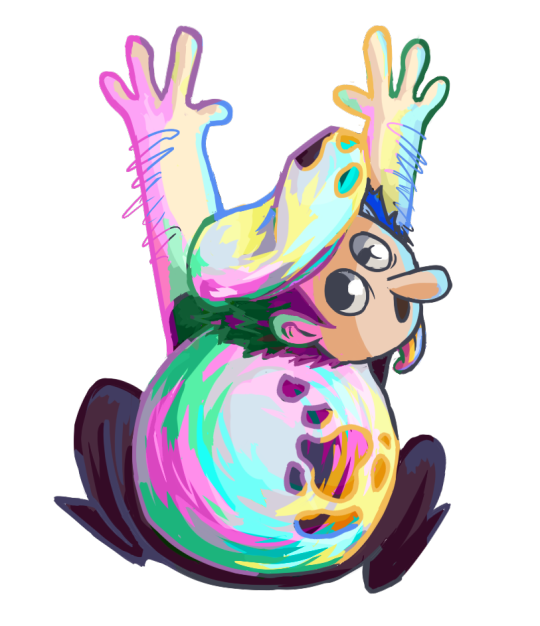
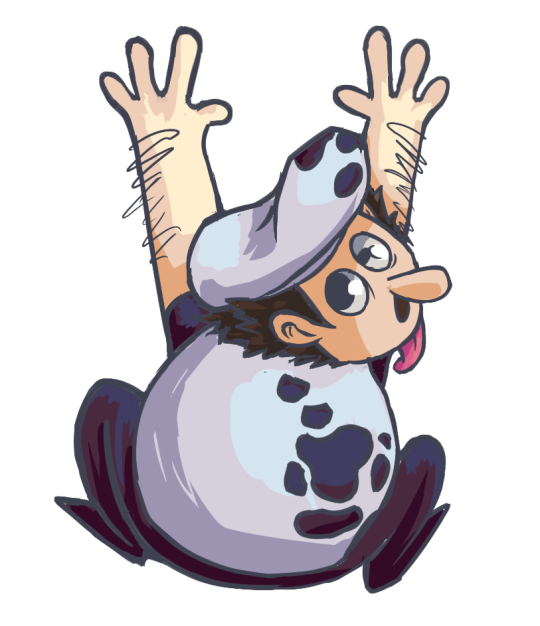
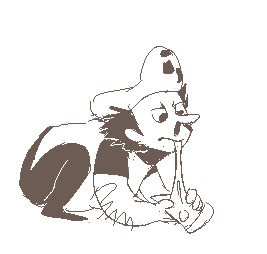

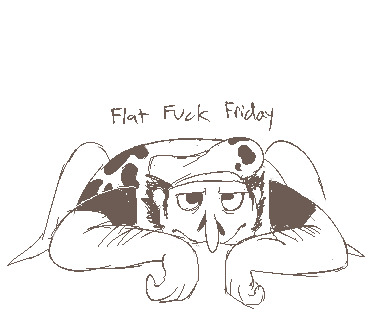
art trade w @eskariolis-con-salsa ! a very vivid gnocchi and also a more normal one bc i doont actually remember how to do color at all.
additional b/w poses bc hehehehehe and a brief encounter with my own version of the beast bc hohohohoho. lots of them >:)
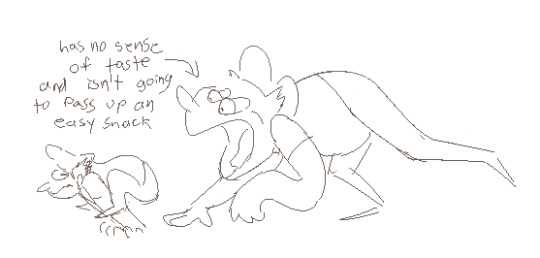

#the original idea was i was gonna do it in funky colors like he had gotten into All The Paint and was Every Color but#it kind of turned into like. soap bubble. which i guess still works thematically so wahoo#arting#pizza tower oc#also i looked up 'cat hanging on screen door' to reference the big pose and gotta say it was a great time really good images in that search
98 notes
·
View notes
Text

making it in the world today takes everything you’ve got
#fionna and cake#fionna campbell#simon petrikov#adventure time#fionna the human#betty grof#kind of lol#i know this is fanart of the FIRST EPISODE when so much has happened since but. i’ve been busy ok#caro art#i’ve been very inspired by the media i’ve been consuming so i’ve been drawing a lot more lately#which is nice#one thing about me. i can only draw thematic artsy renditions of situations i will never be able to draw a scene as it happens#i’m a FEELINGS guy#anyway i also just wanted to draw fionna flipping off the bud with her pants down. peak Hashtag Girl moment
97 notes
·
View notes
Text
my notifs recently got me thinking about the very random concept of "what if there is a second, secret CHB. directly below normal CHB." and i ended up brainstorming it in the discord.
context for how this originated: one was just a random notif on my post talking about the tunnels under the Hephaestus cabin, and the other was some tags from @drksanctuary on my fake readriordan article mentioning the idea of a chthonic demigod camp.
so. my brilliant (read: "smashing my 2 brain cells together") idea: the elaborate and seemingly infinite tunnels under cabin 9 are remnants of an abandoned underground CHB that exists directly underneath camp. It's basically just normal CHB except in a big cave system, probably connected to the labyrinth somewhere and has the separate tunnels, and instead of the Olympian cabins it has chthonic cabins. there's probably also some infernal nymphs and etc down there too. since all chthonic demigods can learn to shadow-travel they probably used that to get down there, and a lot of chthonic demigods probably have geokinesis just by nature, ergo the tunnels (for when they don't want to shadow-travel, or can't).
in brainstorming with the discord we decided it could be cool if some of the cabins lined up with the above-ground cabins, either for thematic purposes or associations or whatever. Like there's maybe a Hermes and maybe Poseidon cabin in the chthonic CHB too that just link to the above-ground ones, but also like Persephone cabin lines up to Demeter cabin because of course it does. and maybe Hecate cabin lines up to Cabin 8 cause Artemis is sometimes 1/3rd of Hecate. Maybe Angelos cabin is beneath Cabin 1, and Zagreus cabin is beneath Cabin 12. Things like that.
The other ones i thought of were either Hypnos or Thanatos cabin lines up with Apollo, because twins, and the other is just right beside it (because twins). And Charon's cabin is beneath Cabin 9, ergo why the tunnel system connects to it (because Charon. Ferryman. Surface access. It makes sense in my brain).
#pjo#riordanverse#headcanon#headcanons#au#< go figure which you wanna classify it as#this is entirely silly musing but it actually kind of works out nicely cause there's far fewer chthonic deities#than there are technical-olympians#so honestly you could get away with having the secondary chb only having a few extra cabins compared to the 12 usual cabins#it definitely wouldnt be any more than the 20 cabins it has by TOA#also for silly thematic reasons i do think itd be funny if despite everything cabin 13 is still inexplicably cabin 13 in underground chb#like. it shouldn't be. that doesnt make sense. but it is. what's the numbering system for the other cabins? who knows#negative numbers would be interesting. cause theyre underground#i do already have the hc of there being a secret extra cabin aboveground in chb nicknamed ''Cabin 0/Zero''#that's a little ways into the woods and kinda run-down cause it goes unused and basically why it exists is because#the ''12 olympians'' is actually inconsistent throughout ancient greece so there's a non-zero chance they could have a demigod show up#whose parent *is* technically one of the 12 olympians but they dont have a cabin for them - like Enodia. ergo: spare cabin#anyways all this musing is intentionally very silly#i just think itd be funny for chb to find out there is a second. more goth chb that is otherwise identical#literally directly below them. for no reason.#''why'd they made a second chb directly below the first one?'' ''idk underworld/chthonic reference i guess''
99 notes
·
View notes
Text
kabru definitely IS human, like i dont doubt it for a second. i mean his parent isnt a fucking bee lmao it’s atavism or smth like milsiril suggests.
but there is such a big part of me that thinks about the parallels with the winged lion he has, his deep sense of alienation and fear of being a monster, and wants to explore what it would do to his psyche if he had to reckon with a monstrous origin or monstrous traits
there are so many options. made into a chimera… something wrt his origin…. personally im partial to some setup wherein he is the result of a demon wish in the vein of the winged lion offering to Give Marcille Children. the dungeon in utaya went through a lot of lords. it probably wasnt where he was born since his mum ran away from his dads family but you could finesse that part. it would evoke the succubus - incubus - demon connection and also explode his self image. also the demon totally would give you a child with a trait that isolated you from your support network
but like idk if this jives thematically….. i just don’t know….. but it’s a fun Imagination Palace. it would really put kabru in the torment nexus, but i think he could grow through it. laios would be So Jealous lmao
#dunmeshi#kabru of utaya#i keep rotating this wrt my fic concepts and i just cant decide if its too thematically inconsistent#especially since i think for both kabru and laios it’s actually kind of important that people who othered him for autism/his eyes are Wrong#abt it making him inhuman#but also like posthumanism innit#monstrosity/alterity as something to embrace &love#dungeon meshi manga spoilers
26 notes
·
View notes
Text
i think there's something to be said about what exactly it means to be "non-human" in a story that is as much about humanity as wolf 359 is, where even the dear listeners are defined less by their own perspective and more by what they fail to understand and therefore reflect about the human perspective - to the point that they don't even have their own voices or faces or identities that aren't either given to them or taken from humans. they speak to humanity as a mirror.
even pryce and cutter are "very much humans" - pryce defined by her resentment of and desire to transcend its limitations, and cutter by his aspirations to redefine and create a "better" type of human - and find the idea that they might not be human laughable. it's interesting that they have distinctly transhumanist aspirations when their goal is the narrative opposite of common science fiction fears: that we will expand the definition of humanity so much that we'll lose whatever it is that makes us human. pryce and cutter's transhumanism narrows the definition of humanity to the worthy and the useful, as defined by them; "there will still be a humanity; it'll just be our humanity."
in direct opposition to that, i think it's meaningful that the show instead expands the definition of humanity in ways that include lovelace and hera, who in another show with different themes might be considered (in the descriptive, non-moralistic sense) non-human. i will always make a point of saying that personhood and humanity are two often-related but meaningfully distinct concepts, especially when talking about sci-fi and fantasy. i am talking about humanity.
the question of how hera identifies, and what social pressures influence that, is a complicated one. i've talked about it before and i will talk about again. what's important for the purposes of this post is that i think the show considers her fundamentally human. think about her role in shut up and listen - consider jacobi's lion example and the concept of different paradigms - that even things that are close to humans, comparatively speaking, understand the world in different ways. whatever differences hera may have from the others, it's primarily in experience, not fundamental understanding. she shares their emotions, their concerns, their values, their thought patterns. she has an appreciation for music, which the show considers a hallmark of humanity. she fits within the framework of humanity as the show defines and is, in her own words, left feeling "uneasy" about how difficult it might be to communicate with beings who don't. and it's significant that this takes place in shut up and listen, of all episodes, specifically because the way she is clearly and unambiguously included in the show's understanding of what it means to be human highlights the ways she and lovelace are othered by eiffel's careless comments that suggest otherwise.
(i don't want to get too into these details for this particular post, but it's worth noting that hera will refer to 'humans' as a category, often when she is upset and feeling isolated, but has never said that she 'isn't human' - she has never been upset that people are treating her 'too' human. i've seen it said about the line "you need to get it through your heads that what goes for you doesn't always go for me", but that's a frustration related to ability and safety, not identity. far more often, she will refer to herself in 'human' terms - referring idiomatically to experiences or body parts etc. that she doesn't literally have - and is upset primarily with comments referring to her status as an AI. it does not diminish how being an AI influences her perspective and experience, but again, so much of that is in terms of ability that it feels almost inseparable from a discussion about disability.)
lovelace's humanity and hera's humanity are so interlinked and directly paralleled in the text that i think it's impossible to really argue one of them is "not" human without making implications about the other. in desperate measures, lovelace tells kepler he's "not human" and he responds "you're hilarious. on a multitude of levels." later, defending lovelace against kepler's repeated dehumanization, hera very pointedly uses the phrase "that woman." in out of the loop, hera says she's never met anyone who "worked so hard at being inhuman" as jacobi, who says "what do you know about being human?" hera very emphatically responds, "i know plenty." later, defending hera against jacobi's repeated dehumanization, minkowski pointedly uses the phrase "that woman." with the care taken towards language and the way scenes and turns of phrase will parallel each other, that's not a coincidence. it might seem strange to have the "non-human" characters be the ones to express criticisms based on perceived "humanity" (something hera will do in other contexts as well - "we don't have funerals for animals" etc.) but in the broader context of the show, i think it's the point.
so, whether hera would ever call herself human, or be comfortable with that, is a complicated question for another time and depends on a lot of other factors. but wolf 359 is a show about humanity, it includes her within its definition of what it means to be human, and i wouldn't be comfortable definitively saying she's not human because of that. it can't be a neutral statement within the particular context of this show.
#wolf 359#w359#hera wolf 359#there are so many concepts here that could be posts on their own#but this is already too long. sorry.#i think it's also worth noting how often i see the discussion of hera and humanity conflated with the discussion of#whether hera would want a body and while i think there's some degree of influence in that. if she has human experiences without human form#there's something uniquely isolating about that that could influence her decision. BUT. the form she exists or doesn't exist in#is separate from whether the show includes her within its 'in group' of humanity. which thematically it does.#hera can be considered equally human without ever having any type of physical form. that's part of expanding the definition#and i think that's an important distinction.#anyway sorry i'm kind of passionate about this it just. doesn't quite sit right with me i guess#in a lot of cases i think it's important to acknowledge that non-human characters have different experiences from human ones and#a lot of science fiction will (or should) decentralize the human experience. but it's core to the themes of wolf 359. it's different.#i think hera is so interesting as a take on the 'human AI' character because. the mistake a lot of them make is having a character#'learn how to be human' and it feels patronizing. but hera is. a fundamentally human person who has been told she isn't#and internalized that. and i think that's much more complex and. well. human. i know she's just a fictional character but#i can't help but feel a little defensive sometimes#it's also part of a larger discussion but feeling inhuman is a not uncommon human experience. it is within those bounds
247 notes
·
View notes